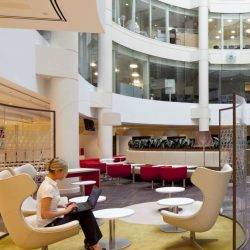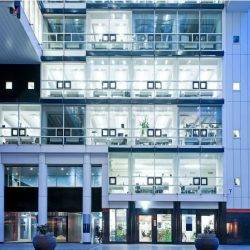April 5, 2017
Corporate occupiers turn to coworking space to keep down property costs 0
 Demand for coworking spaces is growing at an average of 10-15 percent per annum across all regions as firms look to cut their real estate costs by embracing the concept based on shared work spaces and collaboration. That is the key finding of a new report from Cushman & Wakefield. As the trend gains momentum, according to the study, developers are increasingly incorporating the aesthetic and function of such flexible working environments into mainstream building design. However the main driver of uptake continues to be concern about the cost of renting offices in prime locations and it is no surprise that coworking is focussed on major globalised cities.
Demand for coworking spaces is growing at an average of 10-15 percent per annum across all regions as firms look to cut their real estate costs by embracing the concept based on shared work spaces and collaboration. That is the key finding of a new report from Cushman & Wakefield. As the trend gains momentum, according to the study, developers are increasingly incorporating the aesthetic and function of such flexible working environments into mainstream building design. However the main driver of uptake continues to be concern about the cost of renting offices in prime locations and it is no surprise that coworking is focussed on major globalised cities.























 A new guide for facilities management professionals working with clients on BIM construction projects has been issued by the BIFM (British Institute of Facilities Management). Employer’s Information Requirements is a practical 47-page document to support clients using BIM (Building Information Modelling) to advise clients on how to specify their exact requirements for the design and construction phase of a built asset through to its full life-time operation. The purpose of the EIR is to support both FM professionals and clients by providing a template which can be edited and amended by the client or facilities manager to meet individual requirements for the project. Its guidance follows the publication of BIFM’s Operational Readiness Guide For Facilities Managers published in April 2016. Since April 2016, construction projects commissioned by Central Government have been required to use BIM for their procurement and delivery.
A new guide for facilities management professionals working with clients on BIM construction projects has been issued by the BIFM (British Institute of Facilities Management). Employer’s Information Requirements is a practical 47-page document to support clients using BIM (Building Information Modelling) to advise clients on how to specify their exact requirements for the design and construction phase of a built asset through to its full life-time operation. The purpose of the EIR is to support both FM professionals and clients by providing a template which can be edited and amended by the client or facilities manager to meet individual requirements for the project. Its guidance follows the publication of BIFM’s Operational Readiness Guide For Facilities Managers published in April 2016. Since April 2016, construction projects commissioned by Central Government have been required to use BIM for their procurement and delivery.











March 30, 2017
Social technology has the power to make the workplace more humane
by Amanda Sterling • Comment, Technology, Workplace
(more…)